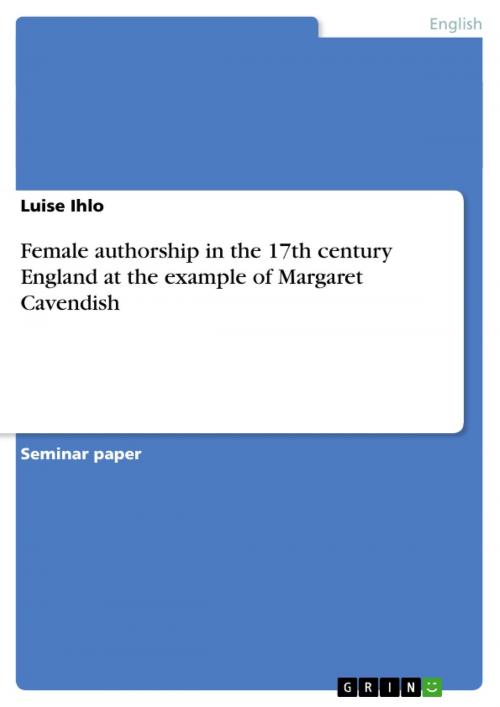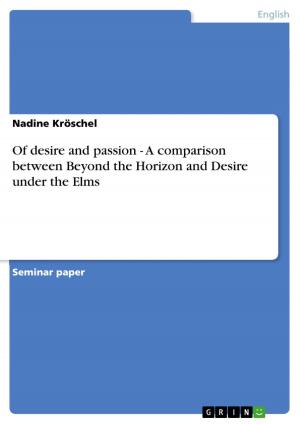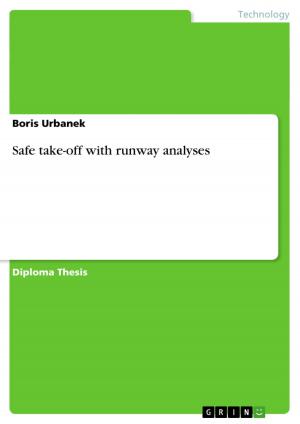Female authorship in the 17th century England at the example of Margaret Cavendish
Fiction & Literature, Literary Theory & Criticism, British| Author: | Luise Ihlo | ISBN: | 9783640556113 |
| Publisher: | GRIN Publishing | Publication: | March 5, 2010 |
| Imprint: | GRIN Publishing | Language: | English |
| Author: | Luise Ihlo |
| ISBN: | 9783640556113 |
| Publisher: | GRIN Publishing |
| Publication: | March 5, 2010 |
| Imprint: | GRIN Publishing |
| Language: | English |
Seminar paper from the year 2010 in the subject English Language and Literature Studies - Literature, grade: 1,3, University of Leipzig (Institut für Anglistik), course: Culture and Literature of 17th century England , language: English, abstract: Contents Introduction 1 The 17th Century Britain 1.1 Political Background 1.2 Population and Religion 1.3 Literature and Theatre 2 Female Authorship 2.1 Situation of Women 2.2 Writing and Publishing as a Woman 3 Margaret Cavendish 3.1 Biography 3.2 Life and Work as a Writer 3.3 Cavendish's Natural Philosophy 3.4 The Atomic Poems Summary Bibliography Introduction The present paper deals with the topic oft female authorship in the literary world of the seventeenth-century England and puts the emphasis on an exceptional and prolific female writer: Margaret Cavendish. This works is divided into three main parts. The first section serves as an introduction to the main topic and provides the reader with background information about the political, social, religious and literary situation during that time. It presents a review of the tumultuous succession of the English throne, the rising Puritan movement throughout the century and the development of English theatre after the era of the Elizabethan Stage at the end of the sixteenth century. The second part describes women's role in the patriarchal society of the seventeenth century and the difficulties of their every-day life. It also points out the obstacles and difficulties women encountered when trying to enter the male-dominated literary world and names Aphra Behn and Katherine Philips as two women, who, nevertheless, established themselves as successful female writers. Finally, the third and last part of this paper is dedicated to the prolific writer Margaret Cavendish, Duchess of Newcastle. It contains an overview of her life and work and especially examines her as the first woman to publish her own natural philosophy, for which she was criticized by many of her contemporaries.
Seminar paper from the year 2010 in the subject English Language and Literature Studies - Literature, grade: 1,3, University of Leipzig (Institut für Anglistik), course: Culture and Literature of 17th century England , language: English, abstract: Contents Introduction 1 The 17th Century Britain 1.1 Political Background 1.2 Population and Religion 1.3 Literature and Theatre 2 Female Authorship 2.1 Situation of Women 2.2 Writing and Publishing as a Woman 3 Margaret Cavendish 3.1 Biography 3.2 Life and Work as a Writer 3.3 Cavendish's Natural Philosophy 3.4 The Atomic Poems Summary Bibliography Introduction The present paper deals with the topic oft female authorship in the literary world of the seventeenth-century England and puts the emphasis on an exceptional and prolific female writer: Margaret Cavendish. This works is divided into three main parts. The first section serves as an introduction to the main topic and provides the reader with background information about the political, social, religious and literary situation during that time. It presents a review of the tumultuous succession of the English throne, the rising Puritan movement throughout the century and the development of English theatre after the era of the Elizabethan Stage at the end of the sixteenth century. The second part describes women's role in the patriarchal society of the seventeenth century and the difficulties of their every-day life. It also points out the obstacles and difficulties women encountered when trying to enter the male-dominated literary world and names Aphra Behn and Katherine Philips as two women, who, nevertheless, established themselves as successful female writers. Finally, the third and last part of this paper is dedicated to the prolific writer Margaret Cavendish, Duchess of Newcastle. It contains an overview of her life and work and especially examines her as the first woman to publish her own natural philosophy, for which she was criticized by many of her contemporaries.















